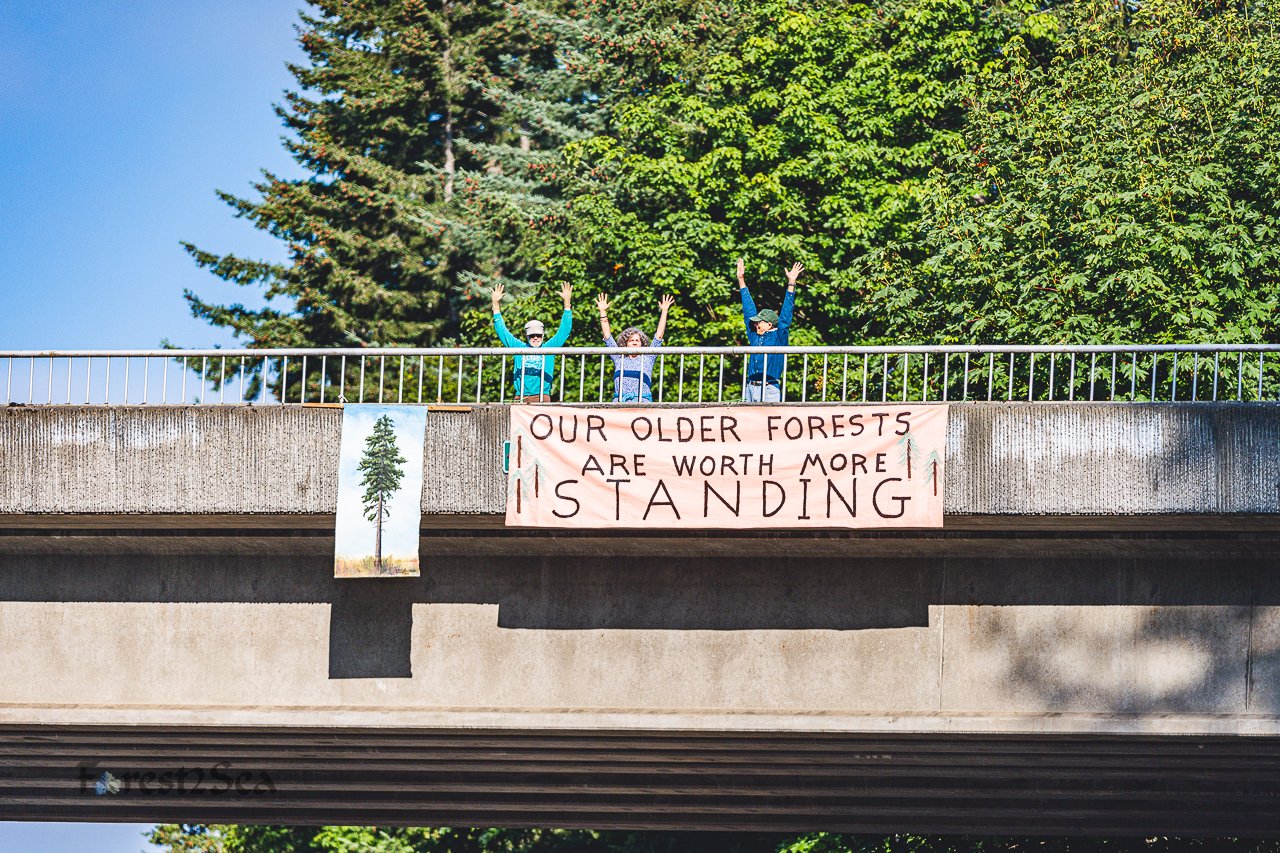
Forests Are Our Future!
rALLY to Protect Our Mature & Old Growth Forests
June 13 IN pORTLAND
Dozens of Organizations deliver letter to US Forest Service Calling on the Biden Administration to halt logging of mature & old growth forests
Read the Letter Here
Join us in taking action to demand a livable future for our forests, climate and communities – we won’t stand for extractive business-as-usual forest management in a climate crisis!
Our mature and old-growth forests are some of our best climate solutions, but they are threatened by a 20th century paradigm that maximizes logging/timber extraction and profits at the expense of our forests, communities, and climate.
This year, the Forest Service and Biden Administration are creating management guidelines for the future of our region’s forests for decades to come the NW Forest Plan Amendment, the National Old Growth Amendment (EO 14702), and the Blue Mountains Forest Plan. We need the Forest Service & Biden Administration to halt logging mature and old growth forests to protect our communities and climate.
With so much on the line, we're rallying at the Forest Service's regional headquarters to demand they halt logging mature & old growth forests and embrace a paradigm shift in how our forests are managed that recognizes our PNW forests as vital climate solutions, protects and restores our remaining mature and old-growth forests, returns healthy fire to the landscape, and values the expertise of indigenous land stewardship.
Rally begins at 3pm and will end at 5pm. Speakers will include:
Victoria Wingell, Oregon Wild
Grace Brahler, Cascadia Wildlands
Angela Sondenaa, NWFP Federal Advisory Committee
Anna Mae Leonard, Wanapum Sustenance Foods & Spiritual Practices Conservation
Paula Hood, Blue Mountains Biodiversity Project
Brenna Bell, 350PDX
Music by Anne Weiss and the Portland Raging Grannies.
Entrenched interests are doing everything they can to preserve an outdated status quo that maximizes private profit and extraction at a time when we need to be protecting our mature & old growth forests more than ever. With only a fraction of old-growth forests remaining in the PNW, it is crucial the Biden Administration halt old-growth logging and preserve what’s left, as well as protect and restore our mature forests that are on their way to becoming the old growth of the future.
Join us in rallying to show the Forest Service & Biden Administration that our communities demand that they stand up for our communities, forests, and climate!
For more information or to get involved,
contact alex@forestclimatealliance.org
What’s at stake for our forests?
NW Forest Plan Amendment
As the Forest Service updates the Northwest Forest Plan for the 21st century, we need the Biden Administration to prioritize the wellbeing of our forests, climate and communities with the new Forest Plan.
Over the last 30 years, the NWFP prevented an estimated ~130 million tons of carbon emissions from making the climate crisis worse–the equivalent of running several coal plants every year!
The NW Forest Plan Amendment is a once-in-a-generation opportunity to establish better protections for mature and old growth forests, meaningful relationships with Indigenous communities and a fighting chance at mitigating the climate crisis.
We need the Forest Service to stand against industry demands that sacrifice our mature forests for their shareholder profits.
Blue Mountains Forest Plan
The future of eastside forests is being decided right now! The Forest Service is drafting new Forest Plans for the Malheur, Umatilla, and Wallowa-Whitman National Forests. These Forest Plans will determine how forests will be managed for decades to come, and affect approximately 5 million acres in the Blue Mountains of eastern Oregon and southeastern Washington.
Eastside forests matter for biodiversity and carbon storage. National forests in the Blue Mountains support wildlife connectivity corridors of regional importance, linking the Greater Rocky Mountain ecosystem and the Cascades. They are home to an incredible diversity of species, such as wolverine, wolves, marten, moose, Bull trout, and many more. Eastern Oregon encompasses approximately half of all forests in the state– forests that support key wildlife habitat and carbon stores.
Large trees in eastern Oregon and Washington are under attack! The Forest Service plans to replace strong existing standards protecting large trees from being logged with guidelines that allow bigger trees to be logged with less public accountability.
We need your help! Because these national forests are rural and often hard to reach, the public narrative and revision process is being dominated by groups that advocate for extractive and/or destructive uses of these forests. The Forest Service needs to hear from the environmental community on these incredibly important issues! Protections for National Forests on the eastside need to be strengthened and expanded in upcoming Blue Mountains Forest Plan Revisions.
National Old Growth Amendment
On December 20th, USDA issued a Notice of Intent (NOI) for a National Forest Plan Amendment to Conserve and Steward Old Growth Forests across the country. This amendment is an important step forward.
This is the first-ever national policy proposal to protect old-growth forests on Forest Service-managed lands from commercial logging. It resets the national conversation around mature and old-growth forests, and sets a baseline expectation that the Forest Service will work to improve abundance and distribution of old-growth across the National Forest System over time.
The outcomes of this process, and how meaningful they actually are, will depend on how far the public can push the agency and Biden Administration to establish enforceable protections. The current language does not go far enough, and leaves far too many mature and old-growth trees vulnerable to logging.
This summer, there will be an opportunity for the public to weigh in and ensure these forests get the protections they deserve. It’s going to take everything we’ve got to shift the culture of the agencies to prioritize safeguarding these important forests for the values they provide to communities, to the climate, to wildlife, and watersheds.
It’s time to move away from the status quo and prioritize the forests for their own right, rather than for a profit.
